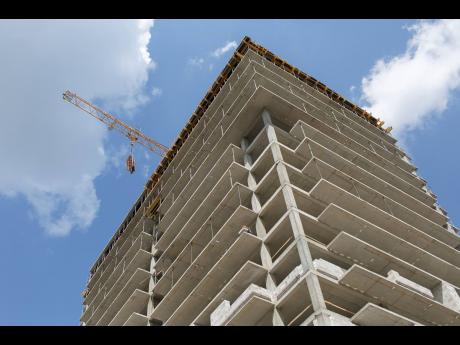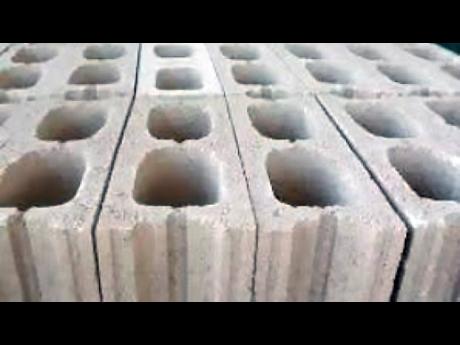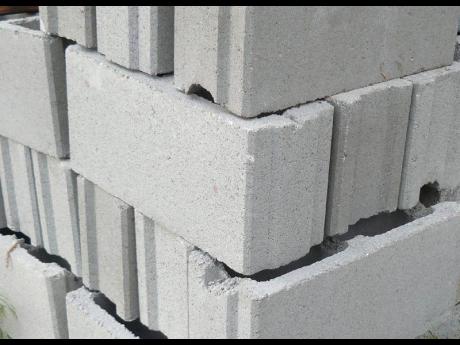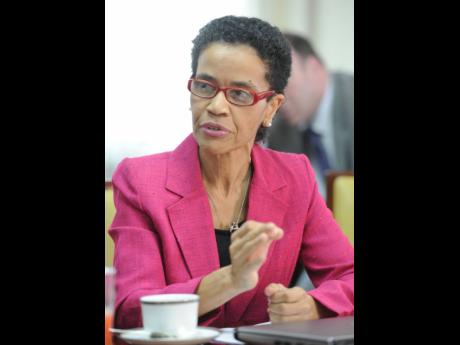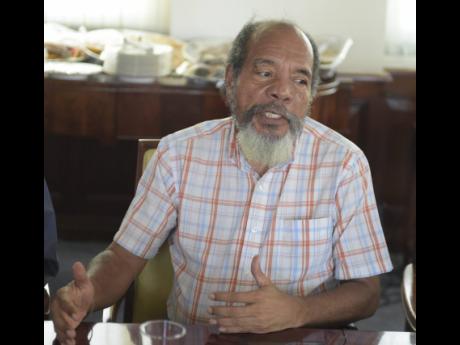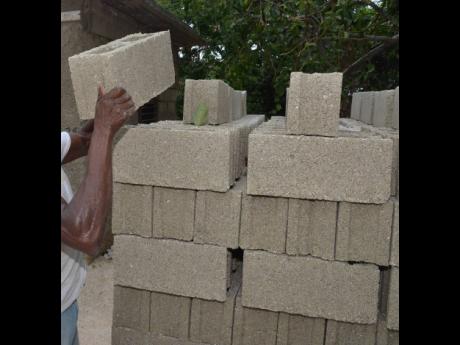Poor-quality building blocks
High percentage of substandard products on the market a ‘public safety’ concern
A 2022 internal assessment at the agency mandated to protect Jamaicans from substandard products identified dozens of manufacturers who were producing blocks that did not meet the minimum requirement for bearing load. But with the Dr Lorice Edwards...
A 2022 internal assessment at the agency mandated to protect Jamaicans from substandard products identified dozens of manufacturers who were producing blocks that did not meet the minimum requirement for bearing load.
But with the Dr Lorice Edwards Brown-led National Compliance and Regulatory Authority (NCRA) not responding to questions submitted by The Sunday Gleaner almost two weeks ago, it is not clear what was done with the data as unsuspecting members of the public continue to buy the substandard products to build houses, apartment complexes, and other structures.
It is the latest troubling issue seeping out of the NCRA, an agency of the Aubyn Hill-run Ministry of Industry, Investment and Commerce that was formerly the regulatory division of the Bureau of Standards Jamaica (BSJ). The BSJ sets standards that are enforced by the NCRA.
From a total of 136 samples taken from 109 block manufacturers across 12 parishes, only 59 samples met the required minimum compressive strength, returning a non-compliance level of 57 per cent, according to an analysis document completed in July.
A sample was equivalent to 10 units of blocks.
The assessment was part of efforts to boost the registration of factories and monitor for compliance.
Illegal block-making enterprises have long been an issue, but this year’s analysis was being viewed in the ministry as a major undertaking to improve the regulatory environment.
The blocks were tested for physical characteristics such as length and height, and compressive strength, based on the Jamaican Standard Specification for hollow concrete blocks (JS 35).
Block makers who meet the standard are issued with one-year registration certificates.
The compressive strength, according to the document in the possession of several ministry officials, is the most important standard for determining a block’s ability to bear load or “to support overlying parts of a building or structure”.
The acceptable compressive strength has been determined to be the minimum average of 10 units of blocks, with a minimum compressive strength of seven Mega Pascals (MPa), a basic unit of pressure or tension measurement.
The 77 samples that did not meet the standard did not have the required compressive strength of seven MPa, the amount of strength needed to bear load.
“The results clearly demonstrate that a 57 per cent non-compliance level of hollow concrete blocks throughout 12 parishes over the period requires urgent attention,” concluded the analysis, which added that “a significant number of the compressive strength results were less than five MPa”.
The document also reveals that 17 manufacturers were sampled for more than one size of blocks, and 16 of the block samples were found to be non-compliant with the standard.
‘HIGH LEVEL OF NON-CONFORMANCE’
Meanwhile, 85 of the 136 samples were taken from manufacturers who wanted to register with the NCRA “but due to the high level of non-conformance, only 40 registration certificates were issued over the period under review”.
Some of the assumed contributory factors behind the poor quality blocks have been linked to unskilled manufacturers, substandard or wrong aggregates, wrong proportion of cement to aggregates, improper curing techniques, hand moulding machines not providing enough vibration or enough compaction of blocks, and use of non-potable water.
According to BSJ specifications, “no blocks shall be sold or used in a building unless it meets the requirement of this standard”.
It is on the basis of the urgency of the analysis’ recommendation and the bureau’s own declaration that questions from The Sunday Gleaner about the actions taken to inform the public of poor-quality blocks and whether any actions were taken against the manufacturers were put to the NCRA’s chief executive officer.
The questions were sent on December 13 to Edwards Brown.
The BSJ, meanwhile, directed queries on whether it has concerns about monitoring and compliance, and how those accountability mechanisms may be improved, to the NCRA.
On whether it has information concerning levels of non-compliance that would justify the intervention of Minister Hill, the BSJ again directed attention to the NCRA.
Senior BSJ officials have confirmed being aware of the NCRA’s internal assessment.
In March, at the launch of the revised standards for hollow blocks and ready-mix concrete, the industry minister emphasised the importance of complying with the standards.
“The health and safety of every individual who lives, works, or undertakes transactions in these spaces depend on whether the construction items and materials meet required specifications. The standards for blocks, concrete, aggregates, and steel [therefore] form the foundation for everything else,” a JIS report quoted Hill saying.
QUALITY CRITICAL TO PREVENT CRUMBLING
Contractor Carvel Stewart argues that it is critical that blocks are made at the minimum standard to prevent crumbling in loading and transporting and ultimately reducing risks after installation.
“If they don’t [crumble in transportation] and you actually install them, then you would be at some risk under some loading conditions,” he said.
“Where you would mainly come into problems is if you do have any earth tremors and they [blocks] are not as competent,” added Stewart, the former president of the Incorporated Master Builders Association of Jamaica (IMAJ).
He acknowledged that a very powerful tremor could also impact “competent” blocks.
Anyone “serious” about block-making, Stewart said, should get their blocks tested at the BSJ, the state entity that establishes standards for products in Jamaica.
He said there has long been a complaint for more block-testing machines to be located outside of Kingston and St Andrew, owing to concerns that manufacturers have to transport the products from far-flung areas of the country.
Delroy Christie, president of the Block Makers Association of Jamaica, said the issue remains a concern for the more than 20 companies that make up the membership but there are steps for a machine to be installed in St James, a recommendation Stewart said has been around for “decades”.
Christie said the association has partnered with the NCRA, the BSJ, HEART/NSTA Trust (the Government’s skills-training agency), and Caribbean Cement for the installation of the testing machine in St James. There is no clear timeline for the completion of that project.
“We want to be able to test the blocks whenever we want to ensure that the quality is okay … that will make life a lot easier for everybody. Because a lot of things happen when a block is not good,” he said.
Christie said while “everybody is making blocks these days”, the solution to the regulatory and quality control issues “is not to punish people who are making blocks incorrectly. The solution to me is to allow everybody an opportunity so that they can improve their block making skills”.
He estimates that there may be between 400 and 500 block makers, ranging from small shops of two or three persons to established companies with dozens of workers.
“The NCRA and the Bureau can’t keep up. They really can’t keep up. So, the thing to do is to get the quality to improve with everybody in the system. So, if we can get HEART to create a block makers’ training programme to certify people who they train, that would be good,” he said.
HIGH DEMAND FOR BLOCKS, JOBS
An operator of a small, unregistered Clarendon-based block making outfit said he and his “partners” went ahead without authorisation because of a high demand for blocks and people seeking employment.
“People wah build dem business and we bring together some yutes who nuh have nothing doing to make blocks. How often you hear buildings falling down in Jamaica?” noted the block maker on why he got into the business. He spoke on condition of anonymity.
However, Dr Barbara Carby, a disaster risk reduction expert, has cautioned against that attitude, noting that the trust test of a building comes when it is under stress.
“The fact that a building stands up in normal conditions doesn’t say it is going to stand up when it is placed under some form of stress,” she said pointing, as Stewart did, to the impact of adverse events such as an earthquake.
“It is very good that they are employing young people. That’s very laudable. But at the same time, we want to ensure that we have the safety of the public at heart as well. The solution, surely, is to train them in how to make the block at the required strength. Public education and training would be the answer,” added the former director general of Jamaica’s Office of Disaster Preparedness and Emergency Management.
Carby said in the case that training is available and “persons still do not take these opportunities and then are found to be non-compliant, well, then you do what needs to be done”.
Among the tools at the ministry’s disposal are ‘cease production’ notices that can be issued to non-compliant entities.
The BSJ said it is aware that “historically, stakeholders have expressed concerns regarding substandard blocks on the market”.
Along with offering free technical advice, a number of stakeholders’ engagement sessions to sensitise players of the need to register and produce quality products have been held, the agency said.
In numerous speeches, Minister Hill has emphasised the key role of the construction sector to the economy.
GROWTH IN CONSTRUCTION INDUSTRY
The Jamaican economy, still in recovery mode, grew 8.1 per cent for the fiscal year ending March 2022 at constant prices. The construction industry, valued then at $185.8 billion, grew 7.0 per cent in the fiscal year.
However, the industry, which showed resilience during the COVID-19 pandemic, recorded a 2.2 per cent decline during the July-September quarter due to a contraction in non-core ‘other construction’, the Planning Institute of Jamaica (PIOJ) reported last month.
Employment has continued on its record lows, standing at 6.6 per cent up to July, compared with a rate of 8.5 per cent in July 2021, the PIOJ said.
The issue of illegal block makers is not new.
In 2019, the president of the Incorporated Master Builders Association, Lenworth Kelly, lamented the “danger to John Public” because “everybody want to eat a food, but eat a food could cost di people dem life”.
The news report noted then that there were only 55 registered block manufacturers islandwide, compared to 128 in 2017.
The NCRA has been in the spotlight after a Sunday Gleaner probe that exposed the release of a substandard shipment of rice linked to a company in which Health and Wellness Minister Dr Christopher Tufton is the sole shareholder.
The Government has since announced a “comprehensive review” of Jamaica’s rice-importation regime arising from the situation that involves Blue Zone Limited, the company run by Tufton’s son, Charles.
The NCRA’s boss authorised the release of the detained products on July 20, the same day that test results from the BSJ showed that the rice exceeded the maximum allowed broken kernels for Grade A rice.
Poor-quality blocks linked to:
• Unskilled manufacturers
• Substandard or wrong aggregates
• Wrong proportion of cement to aggregates
• Improper curing techniques
• Hand-moulding machines not providing enough vibration or enough compaction of blocks
• Use of non-potable water

